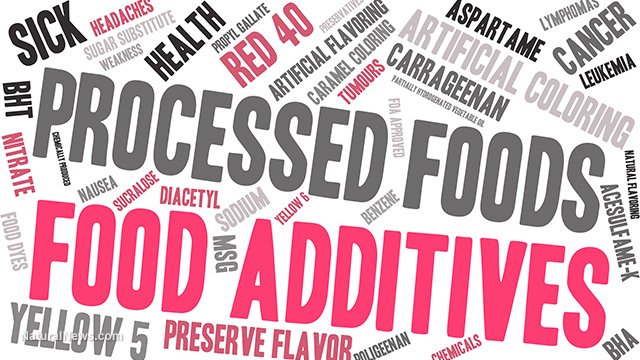 Parler
Parler Gab
Gab
- Arizona's HB 2164, the "Arizona Healthy Schools Act," bans ultra-processed foods containing harmful additives (e.g., potassium bromate, synthetic dyes) in public school cafeterias and vendor-sold meals. The law takes effect in the 2026–2027 school year.
- The additives are linked to childhood obesity, diabetes, behavioral disorders and other health issues. The law emphasizes whole, minimally processed foods for taxpayer-funded school meals.
- Backed by both parties and Department of Health and Human Services (HHS) Secretary Robert F. Kennedy Jr., enforcement falls to the Arizona Department of Education (ADE), requiring compliance reports but no major administrative overhaul.
- California's AB 418 (the "Food Safety Act") bans four additives (e.g., red dye No. 3, brominated vegetable oil) statewide by 2027, with fines up to $10,000 for violations. Unlike Arizona's school-focused law, this applies to all food sales.
- Both laws aim to push manufacturers to reformulate products with safer alternatives. Major brands like Coke and Pepsi have already phased out some of these ingredients voluntarily.
California bans the manufacture, sale or distribution of four food additives statewide
This move follows the landmark Assembly Bill 418, dubbed as the Food Safety Act, in California. AB 418, signed by Gov. Gavin Newsom in October 2023, bans the manufacture, sale or distribution of four additives – including brominated vegetable oil, potassium bromate, propylparaben and Red Dye No. 3. These additives are linked to health issues like cancer, hormone disruption and mood disorders and commonly found in popular cereals, sodas, candies and baked goods. (Related: Newsom orders crackdown on processed foods as obesity epidemic grows.) Assemblyman Jesse Gabriel (D-Woodland Hills), who authored the bill, emphasized that the law does not ban specific foods but rather pushes manufacturers to make minor recipe changes and switch to safer alternatives. "What we're really trying to get them to do is to change their recipes. All of these are nonessential ingredients," Gabriel said at that time. Major brands, including Coke, Pepsi, Gatorade and Panera, have already phased out some of these ingredients. The law, set to take effect on Jan. 1, 2027, will impose fines of up to $10,000 for violations. It also applies statewide, whereas Arizona's measure focuses solely on schools. StopEatingPoison.com has more stories about the dangers of ultra-processed foods. Watch the following video to learn what ultra-processed foods do to the body. This video is from the Daily Videos channel on Brighteon.com.More related stories:
Studies show ULTRA-PROCESSED FOODS put millions of people in the U.K. at risk of cardiovascular disease.Ultra-processed foods cause cognitive decline and dementia, study finds.
Study: Consumption of processed foods can negatively affect brain function.
Replace ultra-processed foods with these HEALTHY alternatives.
Sources include: TheEpochTimes.com Azleg.gov USAToday.com X.com AZFreenews.com LATimes.com Brighteon.comDill: An ancient superfood with modern healing powers
By Ava Grace // Share
U.S. Army suspected of orchestrating annual flu seasons to advance depopulation agendas
By Finn Heartley // Share
Florida chemtrail samples show moving organisms under microscope – experts stunned
By Finn Heartley // Share
Governments continue to obscure COVID-19 vaccine data amid rising concerns over excess deaths
By patricklewis // Share
Tech giant Microsoft backs EXTINCTION with its support of carbon capture programs
By ramontomeydw // Share
Germany to resume arms exports to Israel despite repeated ceasefire violations
By isabelle // Share










